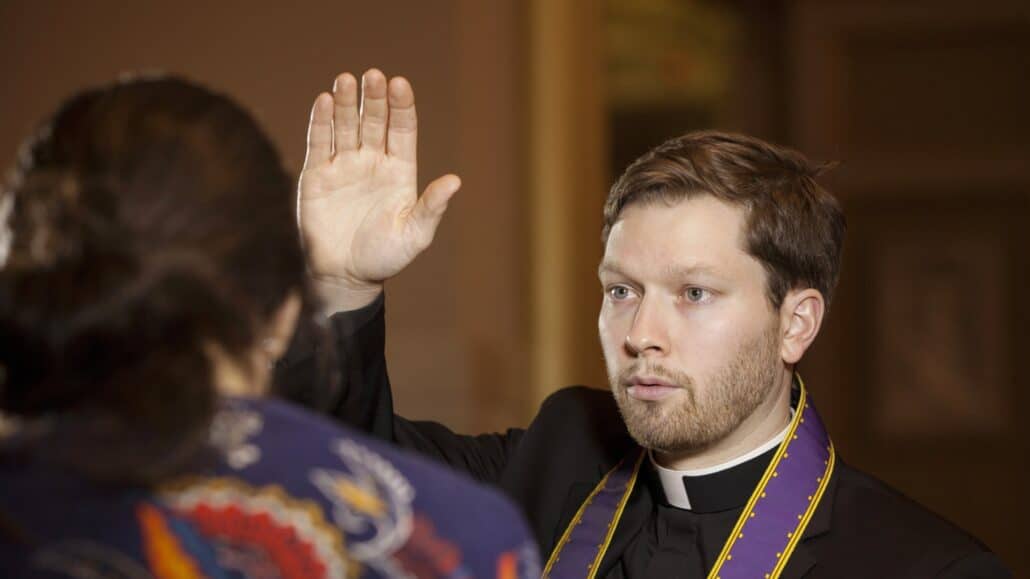Now that we are in the midst of the Lenten season, parishes will be offering several opportunities to receive the Sacrament of Reconciliation. It’s fairly common knowledge that many people have pretty much eliminated this sacrament from their lives–perhaps not consciously, but simply pushed it aside.
Let’s face it. It’s not easy to admit our sins, and it’s even harder to confess them to another person, even if it is a priest. I can only assure you that every priest, including myself, must confess his sins to his brother priest. In fact, if you do attend a parish communal penance service, you have probably seen most of the confessors, before or afterwards, move to another priest to confess their sins and receive absolution.
In some ways it may seem a burden. And yet, to be truthful, there is hardly anything more adult and mature that we can do than face our own faults and sins. Some may say, “Well, I just go directly to God.” But my question is: Do you actually examine your conscience, sit down quietly, confess your sins to God and ask forgiveness? Or is this merely a way of saying, “Well, God knows I’m sorry.”
As difficult as this can be, it is one opportunity to actually ask ourselves how we have acted towards our families, spouses and those around us. While I might call myself a Catholic, have I done what I need to do in living my faith? Lent is a perfect time to give honest answers to these questions.
How we approach the reception of God’s mercy is important. We are God’s children. We come to the father to ask his forgiveness through the mercy of Jesus given by the ordained priest. It’s not just ritual. It is life.
Simple Steps to Receiving the Sacrament
Examination of conscience. This is not supposed to be a torture session. Actually, our consciences will bring to mind any serious sins we have committed. Even people who have been away from the confessional for many years, even decades, realize that knowing our sins is not the hard part. It’s actually owning up to them to another. Keep in mind that God knows the whole past in every detail anyway. We make an honest effort to know ourselves and our failings. But, again, it’s God’s mercy that is most important.
Sorrow for sin. If we are serious about going to confession, sorrow comes almost automatically. After all, we are admitting we are sinners right up front. That truthful admission brings sorrow. But please don’t confuse sorrow with emotions or feelings. You may still struggle with feelings of resentment and yet tell God you are sorry for the time you were angry with another person. Sorrow is in the heart (not feelings) and in the will.
Confession of sin. Confess your sins as simply and as honestly as you can. It is easy to link sin with a commandment: missing Mass (third), anger (fifth), impurity (sixth, ninth). There is no need for great details, nor is the priest interested in detail. If you need help, don’t hesitate to ask the priest for assistance.
Receive penance given. Listen to the words of the priest as he tries to guide you and remind you of God’s love for you.
Act of contrition. Making an act of contrition can be very short: “O, God, I am sorry for all my sins, now and in the past, and I will try with all my heart not to sin again.”
Thanks be to God. Leave the confessional and thank God for his forgiveness and pray the prayers the priest gave you for a penance.
Don’t Worry about Past Sins
Now, a very important point. When God forgives sin through the absolution of the priest, he forgives ALL our sins, including those we cannot remember. We need to be sincerely sorry for all our sins. Otherwise, why go to the Lord for forgiveness?
If you later remember something you forgot, dismiss it from your mind. It is gone forever, and the Lord wants you to trust his mercy, put the past aside and the live each new day in his love, one day at a time. What happens when we spend too much time on the past to make sure we got it all is that we become self-centered. And let’s face it: We will never get it all. Confession is much more about trust than exact numbers and detail.
Finally, people wonder how often we should receive this sacrament. It is required only for serious or mortal sin. But the sacrament is a gift, and it is good to present ourselves to the Lord even when we have nothing serious to confess. As difficult as this sacrament may sometimes be, isn’t it true that we leave with a sense of peace, a fresh start, a feeling of having faced our weaknesses and admitted them and received forgiveness? That’s my experience.









1 thought on “Lent and the Sacrament of Reconciliation”
Pingback: The Little Things That Are Key to Your Great Lent – Genuflect
Comments are closed.